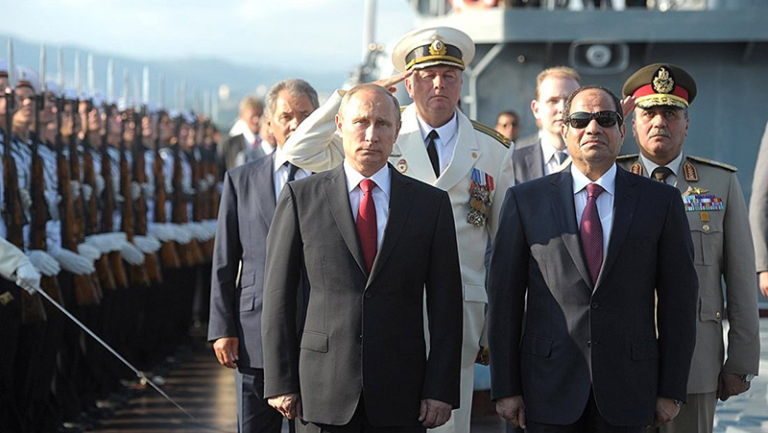
A leaked US intelligence document has revealed that Egypt’s President Abdel Fattah el-Sisi allegedly instructed officials to secretly produce and ship rockets, artillery rounds, and gunpowder to Russia. The document, which was dated February 17, stated that Sisi ordered the production of up to 40,000 rockets to be sent to Russia covertly. He reportedly told his subordinates to keep the operation under wraps to avoid any problems with western countries.
While Egypt has emphatically denied the leaked information, US officials remain cautious in their response. White House National Security Council Spokesperson John Kirby stated that there is no evidence to suggest that Egypt has followed through with the alleged plan. However, if proven true, the revelation could pose serious questions about the motives behind Sisi’s decision to provide Russia, a major US adversary, with lethal weapons. Egypt is one of the world’s top recipients of US military aid, receiving $1.3 billion in military assistance annually, and has been a key strategic ally for the US in the MENA region for the past five decades.
Decoding Sisi’s Gambit
There are four key factors that could explain Sisi’s gambit. First, Sisi has played a critical role in strengthening ties between Egypt and Russia over the past decade. Since coming to power in 2014, he has sought to establish a close personal relationship with Putin, culminating in the signing of a long-term Egypt-Russia comprehensive partnership agreement in Moscow in 2018. This pact covers a broad range of areas, including military, security, trade, and economic cooperation, and it attests to the ever-growing partnership between the two countries. Therefore, providing Russia with arms and weaponry seems to reflect the depth of the relationship between Egypt and Russia.
Second, a “weapons for wheat” deal can be seen as a potential reason behind Sisi’s move. Egypt is the world’s biggest wheat importer, and more than 70 percent of its wheat imports come from Russia and Ukraine. However, the ongoing conflict between the two has caused food prices to soar, adding pressure to Egypt’s struggling economy, which is already weighed down by record-high foreign debt. To alleviate this, Egypt can sell arms to Russia in exchange for wheat, saving billions in foreign currency that could otherwise be used to repay the country’s foreign debt.
Third, Russia is funding several large projects in Egypt, including the establishment of a nuclear power plant that will cost $28.5 billion, funded by a $25 billion loan from Russia. Additionally, Russia and Egypt signed a historic economic deal in February of 2023 to create a factory for the maintenance and overhaul of train coaches. These projects are funded by Russia, and one way for Egypt to repay this debt is to provide military support to Russia in its intense ongoing war with Ukraine.
Finally, it seems that Sisi is making efforts to leverage the current US-Russian rift in a way that is reminiscent of the Cold War era in order to advance his regime’s interests. This is occurring at a time when the US has been pressuring Egypt to address its poor human rights record. Additionally, it appears that Sisi is taking advantage of the perceived weakness of the Biden administration and its shifting position in the region, which created concerns among US allies about a potential power vacuum in the region. In fact, Sisi’s audacity in planning to supply Russia with lethal weapons speaks volumes about his perception of the Biden administration.
The United States’ Cautious Response
While US officials have denied any evidence of Egypt supplying Russia with lethal weapons, the recent revelation of the leaked intelligence document could still have significant repercussions for the relationship between Cairo and Washington. US lawmakers have expressed concerns about President Sisi’s reported plan, with Senator Chris Murphy stating, “If it’s true that Sisi is covertly building rockets for Russia that could be used in Ukraine, we need to have a serious reckoning about the state of our relationship.”
However, the US now finds itself with limited options in terms of diplomatic action. One potential course of action could be to apply the Leahy Law, which stipulates that military assistance to countries that violate human rights should be reduced, and thereby withhold a portion of the military aid it provides to Egypt, a tactic that has been employed in previous instances of diplomatic disagreement. An example of this was when in 2017 the Trump administration delayed $195 million in military funding due to concerns over Egypt’s human rights record and its relationship with North Korea. However, implementing this tactic now could be counterproductive, as it might alienate Sisi and push Egypt further toward Moscow.
Additionally, the Biden administration may also consider another course of action, imposing or threatening to impose conditions on the annual US aid to Egypt. Conditioning the aid could serve as a tool for expressing US disapproval and opposition to Egypt’s increasing military and strategic ties with Russia. Such a measure could serve as a form of diplomatic pressure, with the hope of urging the Egyptian government to reassess its relations with Russia. However, there are several hurdles that could impede the adoption of such a strategy, including opposition from lawmakers who advocate for maintaining strategic relations with Egypt.
Finally, another potential option for the US in response to the intelligence leaks is to increase criticism of Cairo’s human rights record. The US has long had concerns about human rights abuses in Egypt, including restrictions on freedom of expression, suppression of political dissent, and extrajudicial detentions. By voicing public criticism of Egypt’s record on human rights, the US can signal its displeasure with the country’s actions while also reinforcing its commitment to democratic values and human rights. However, the credibility and effectiveness of the United States’ human rights concerns as a tool for enforcing policy are undermined by its long history of supporting authoritarian regimes in the region and beyond. The success of any of these options is dependent on several factors, including the United States’ reliance on Egypt to advance its strategic interests in the region and Egypt’s critical role in the Israel-Palestinian conflict.
In conclusion, Sisi’s move to supply Russia with lethal weapons appears to have been a calculated one, although it carries the risk of possible negative consequences. The exact impact of this leaked document on the longstanding close relationship between the US and Egypt remains uncertain.
The views expressed in this publication are the author’s own and do not necessarily reflect the position of Arab Center Washington DC, its staff, or its Board of Directors.
Featured image credit: Kremlin.ru

